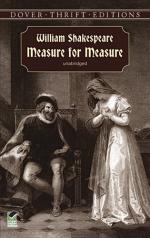|
This section contains 2,451 words (approx. 7 pages at 400 words per page) |

|
Numerous critics have evaluated the dual nature of Angelo- how it is reflected in the play's structure and how it represents the concerns of Renaissance society. Leo Kirschbaum goes so far as to observe that Measure for Measure presents us with "two strikingly disparate characterizations" of Angelo that cannot easily be combined to form a single, unified character. At the beginning of the play, Kirschbaum observes, Angelo "is a keen if hard protector of orderly society" whose fall from grace after meeting Isabella is in keeping with the downfall of such tragic figures as Othello or Macbeth. However Kirschbaum points out that after Act II, the Angelo we see is a grasping, "small-minded" man no longer capable of tragic actions but instead reduced to jilting his fiancée over a lost dowry. In light of this discrepancy, Kirschbaum speculates that, for Shakespeare, the overall impression that...
|
This section contains 2,451 words (approx. 7 pages at 400 words per page) |

|




